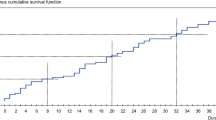Abstract
The objective of this study was to measure the extent to which self-functioning traits relate to meal compliance in eating disorder patients by using multiple regression analysis. Compliance was the dependent variable. It was recorded on a meal flowsheet during breakfast, lunch and dinner and compiled for the 8 days immediately preceding each patient’s discharge. The independent variables were gender, self-esteem (Rosenberg Scale) and 7 subscales of the Eating Disorder Inventory (EDI-2): drive for thinness, body dissatisfaction, ineffectiveness, perfectionism, interpersonal distrust, interoceptive awareness and maturity fears. A random sample of 30 subjects who completed the above instruments before May 1999 were included in the study. The results suggest that close to 50% of their meal compliance can be explained by variations in four explanatory variables: gender, ineffectiveness, interoceptive awareness and distrust. The adjusted r2 was 0.497 and the significance of the equation, measured by the p-value, was p=0.0002. We conclude that multiple regression analysis is a valuable tool to identifypatients’ traits with the strongest effect in meal compliance.
Similar content being viewed by others
References
Garner D.M., Garfinkel P.E. Handbook of treatment for eating disorders, 2nd Ed. New York, The Guilford Press, 1997.
Fairburn C.G., Norman P.A., Welch S.L.: A prospective study of outcome in bulimia nervosa and the long-term effects of three psychological treatments. Arch. Gen. Psychiatry, 52, 304–312, 1995.
Thompson J.K.: Body image, eating disorders, and obesity-An emerging synthesis. In: Thompson J.K. (Ed.), Body image, eating disorders, and obesity. Washington, DC, American Psychological Association, 1996.
Zerbe K.J.: Extending the frame: Working with managed care to support treatment for a refractory patient. In: Werne J(Ed.), Treating Eating Disorders. San Francisco, Jossey-Bass Inc., 1996.
Werne J.: Introduction. In: Werne J.(Ed.), Treating eating disorders. San Francisco, Jossey-Bass Inc., 1996.
Bruch H.: The golden cage. Cambridge, MA, Harvard University Press, 1978.
Crisp A.: Anorexia nervosa: Let me be. New York, Grune & Stratton, 1980.
Garfinkel P.E., Garner D.M.: Anorexia nervosa. A multidimensional perspective. New York, Brunner/Mazel, 1982.
Johnson C., Connors M.E.: The etiology and treatment of bulimia nervosa: A biopsychosocial perspective. New York, Basic Books, 1987.
Griffiths R.A., Beumont P.J., Giannakopoulos E., Russell J., Schotte D, Thornton C., Touyz S.W., Varano P. Measuring self-esteem in dieting disordered patients: the validity of the Rosenberg and Coopersmith contrasted. Int. J. Eat. Disord., 25, 227–231, 1999.
Garner D.M.: The Eating Disorder Inventory -2 (EDI-2), Professional manual. Odessa, FL, Psychological Assessment Resources, Inc. 1990.
Anderson A.E., Cohn L., Holbrook T. In:... (Eds.), Making weight: men’s conflicts with food, weight, shape and appearances. Carlsbad, CA, Gurze Books, 2000.
User’s guide to SPSS base 10 for Windows. SPSS, Inc.
Levine D.M., Berenson M.L., Stephan D.: Statistics for Managers. Upper Saddle River, NJ, Prentice Hall, 1998.
McNulty P.A.: Prevalence and contributing factors of eating disorder behaviors in active duty Navy men. Mil. Med., 162, 753–758, 1997.
Fisher M., Schneider M., Pegler C., Napolitano B.: Eating attitudes, health-risk behaviors, self-esteem and anxiety among adolescent females in a suburban high school. J. Adolesc. Health, 12, 377–384, 1991.
Author information
Authors and Affiliations
Rights and permissions
About this article
Cite this article
Bean, P., Shiltz, T., Hallinan, P. et al. Self functioning traits affecting meal compliance in eating disorder patients. Eat Weight Disord 5, 198–205 (2000). https://doi.org/10.1007/BF03354446
Received:
Accepted:
Published:
Issue Date:
DOI: https://doi.org/10.1007/BF03354446



